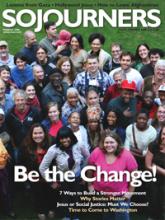I’ve always believed that the gospel is good news to the poor. My parents are both Baptist ministers who preached a lot about the “kingdom of God.” They didn’t mean just a spiritual reality—going to a disembodied heaven when you die—they meant building a more just society on earth. After all, Jesus taught us to pray “thy kingdom come, thy will be done on earth as it is in heaven.” But I also grew up in a moderately evangelical subculture that encouraged us to make a personal decision for Christ and share our faith with others.
As I grew older, I realized there was a “Great Divide” in Protestantism between the people who did evangelism and the people who did social justice. Christians who worked for justice talked a lot about the “social gospel.” Christians who did evangelism often dismissed social activism, saying things like, “we believe in preaching the gospel, not the ‘social gospel.’” I felt pressured to choose sides, so I sided with justice. I figured that if it wasn’t good news to the poor, then it wasn’t the gospel of Jesus Christ.
When I was in college, I got involved with a movement called “Friends of Justice,” which overturned a corrupt drug sting in my hometown that targeted African Americans. I organized a youth group to empower children of incarcerated parents to be change agents in the community. At a summer camp, I talked to a group of street-wise youth about Jesus’ teachings on nonviolence. The kids were intrigued, but skeptical. “If I turn the other cheek, everyone’s going to say that I’m a punk!” objected Anthony. His friend quipped, “I know which cheek I’m going to turn!”—and showed us how he would moon his imaginary aggressor.
Read the Full Article

